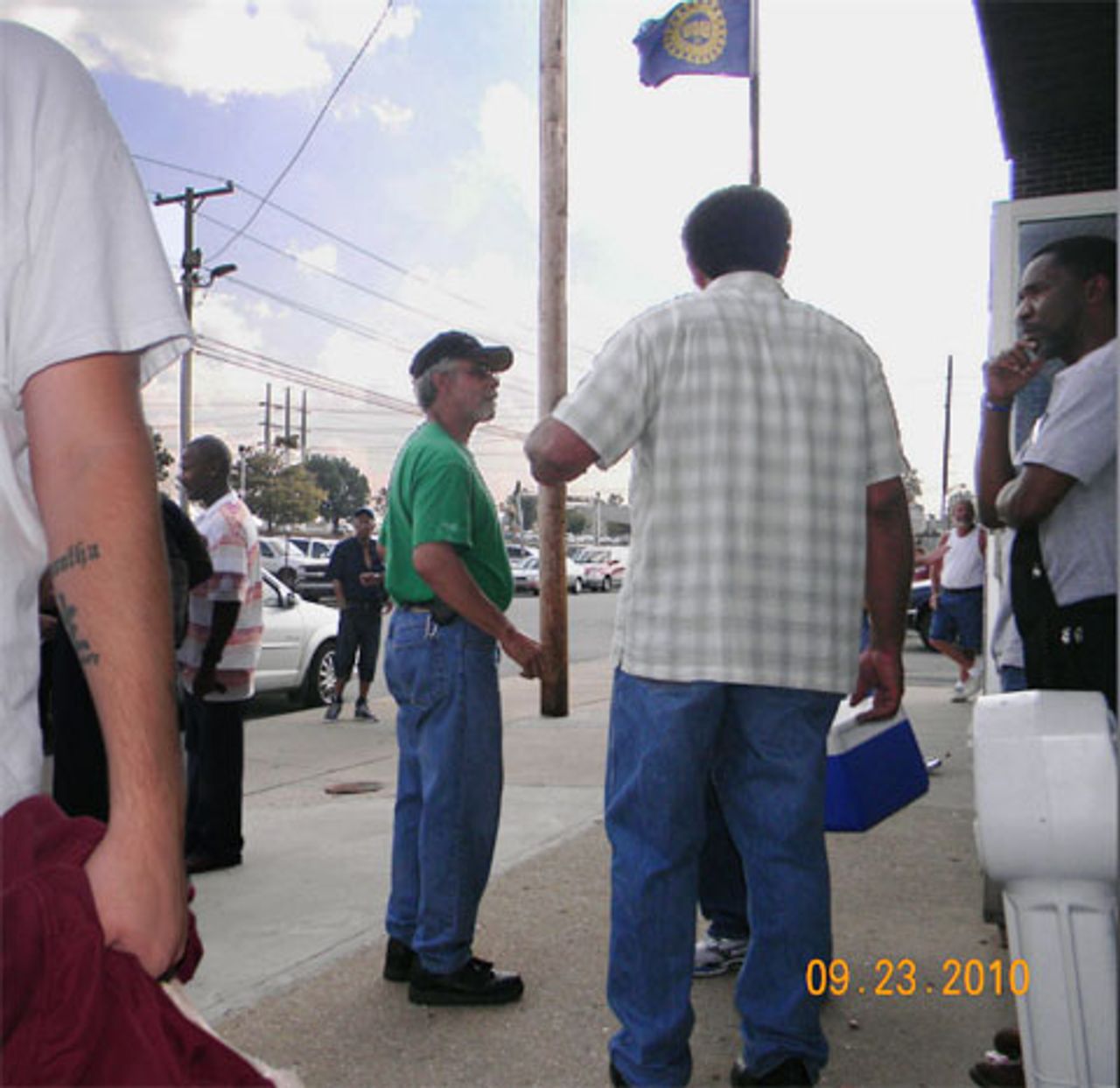 Indianapolis auto workers outside the local union hall
Indianapolis auto workers outside the local union hallAn overwhelming majority of workers at the General Motors stamping plant in Indianapolis cast “no” votes on their mail-in ballots Thursday, rejecting the latest effort by the United Auto Workers union to ram through a 50 percent wage cut over the opposition of rank-and-file workers.
According to officials at UAW Local 23, more than 400 of the factory’s 650 workers voted against the deal. Each vote was recorded by video to prevent a fraudulent count by the UAW International, before the ballots were mailed to the American Arbitration Association, which is conducting the count. Official results, which will include those mailed in separately, are expected by September 28.
 A worker expresses himself
A worker expresses himselfThe rejection of the deal is another rebuke to the UAW, which has conducted a months-long campaign of dirty tricks, intimidation and lies to break the resistance of workers. In rejecting the UAW-backed concessions—which would have cut hourly pay from $29 to as low as $14—the Indianapolis workers have taken a courageous stand not only for themselves but all workers.
Workers in the plant have repeatedly opposed the attempt to impose poverty level wages at the plant. Last May, they voted by a 95 percent margin against opening the current contract with GM and barred the UAW from negotiating with JD Norman, a corporate raider seeking to buy the plant. On August 15, workers threw UAW officials out of their local union meeting for negotiating a deal behind their backs, and the UAW was forced to cancel a vote scheduled for the next day.
What followed was a five-week campaign by UAW International President Bob King, Region 3 Director Maurice Davison and others to force a vote on the deal based on the bogus claim that only a “vocal minority” opposed voting on the agreement. GM ratcheted up threats to close the factory by removing dies, and Indiana Governor Mitch Daniels, Democratic Congressman André Carson and others exerted enormous pressure on UAW Local 23 officials to allow a vote.
Well aware that they could never get their sellout passed at a general membership meeting, the UAW International circumvented the local and organized a mail-in ballot—a process rarely used in ratification votes.
 Workers outside the union hall
Workers outside the union hallHundreds of workers showed up at the “Solidarity Vote” at the UAW Local 23 hall to voice their opposition. “Workers just slammed this deal,” one worker told the WSWS. “They are talking about how proud they are for standing up and voting no. What has been done to us is wrong. Everybody had a badge number and a ballot and they held it up for the camera. They did that on their own free will because they wanted to do what was right.
“One guy who was near his 30-year retirement said he was thinking of voting yes, but he changed his mind and said, ‘I can’t throw away everything that I worked for all these years for nothing.’ Even the young temporary workers who Norman was promising full-time work came out against it. They said they couldn’t afford to pay insurance out of their own pockets. The agreement says if JD Norman takes over the plant he will have the right to say yea or nay on any situation. Workers will have no rights. He can fire them, lay them off; everything is his decision. The first offer he said wages would go down to $15.50; now he saying its $14 for new hires.”
While delivering a blow to the UAW, the vote poses the need for Indianapolis workers to mobilize against the inevitable counter-attack by the UAW, the corporations and the government. This includes preparations to fight any further removal of equipment and other moves to close the factory.
Prior to the vote, the recently formed GM Stamping Rank-and-File Committee issued a statement warning workers that they have to prepare for the next stage of struggle. This meant fighting to mobilize the widest sections of auto workers independently of the UAW against both the wage cuts and the threat to shut down the factory.
“Even if the vote comes back ‘No’, the UAW will try to find some way to push it through anyway,” the statement of the rank-and-file committee said. “This is why it is urgent that we the workers organize independently to carry out a struggle… The UAW, which was once an organization that defended workers has turned completely against us.
“The rank-and-file committee is fighting to break the isolation the UAW has imposed on us. We are reaching out to our brothers and sisters in Marion, Flint and other GM plants to organize a common fight. At the same time the committee is making an appeal to all working people in Indianapolis and across the country to stand with us to defend jobs and living standards.”
An appeal issued by the committee evoked an outpouring of letters of solidarity from workers across the US and other countries, including Canada, South Africa, Japan and New Zealand. Last week, workers at the Flint, Michigan stamping plant welcomed the news of the struggle of the workers in Indianapolis, saying the UAW and GM planned to impose similar wage cuts on them next. As one member of the committee told the WSWS, “Workers all over the world can see that we are saying enough is enough.”
This powerful support must be mobilized to defend the right to a secure job and decent living standard for every worker. Preparations should be made to organize demonstrations, protests, plant occupations and strikes to overturn the wage cuts imposed by the UAW and Obama administration last year.
The Local 23 leadership has not proposed any of these things. Instead, the perspective of Shop Chairman Greg Clark and other local leaders is that a “no” vote and legal appeals to the National Labor Relations Board will force the UAW International to back down. Moreover, they accept the shutdown of the plant, arguing that older workers can transfer to other GM facilities. Such a position cuts across any appeal Indianapolis workers can make to rally workers throughout the city and the state who are battling high levels of unemployment and want the right to a job.
No amount of pressure—including from the government’s National Labor Relations Board, which has a long record of defending the corporations and their lackeys in the unions—will change the UAW. On the contrary, UAW executives—who now own a substantial stake in the auto companies—have a direct financial interest in driving down labor costs in order to boost the value of their shares. They are determined to push through the wage cut in Indianapolis in order to set a precedent to permanently lower wages throughout the auto industry.
The stock holdings of the UAW do not create a “conflict of interest” because the UAW is not on the side of the workers—it is fully on the side of the corporations. UAW International President Bob King made this clear in an interview published in the Detroit Free Press Thursday. “This is a different UAW,” he said. “This is a UAW that understands the importance of global competitiveness.” Asked if the union would fight to substantially raise wages, he said, “There is a pretty broad understanding that we can’t bargain agreements that make the companies long-term uncompetitive. We don’t want to get back into the spiral that we just got out of.”
This is entirely in line with the Obama administration’s agenda of doubling exports by closing the wage gap between US workers and their brutally exploited counterparts in China and other countries.
The repudiation of the UAW by the Indianapolis workers and the establishment of the rank-and-file committee are clear indications of the reemergence of major class battles, as workers oppose the attempts by the corporations and government, in collaboration with the unions, to impose poverty-level wages throughout the US and internationally.
Subscribe to the IWA-RFC Newsletter
Get email updates on workers’ struggles and a global perspective from the International Workers Alliance of Rank-and-File Committees.
